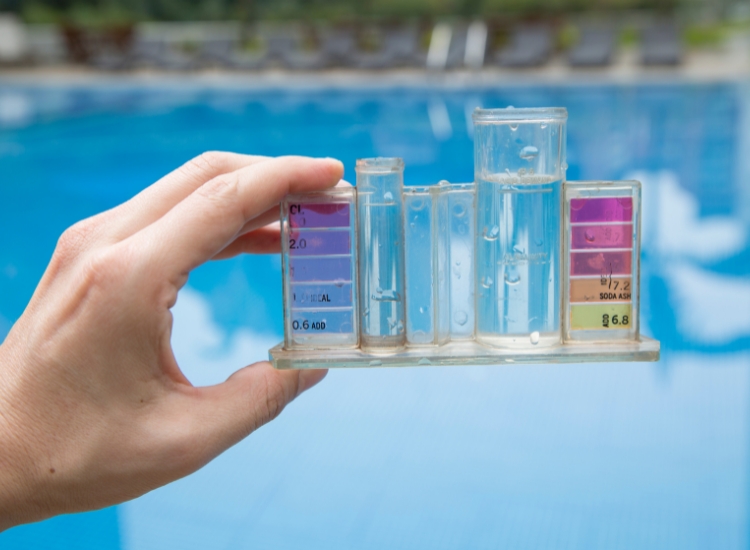Do Ticks Die in Chlorine Swimming Pools? The Truth Revealed

Do ticks die in chlorine swimming pools? It’s a common question for those who enjoy spending time in the water during the warmer months. Ticks can be a nuisance and carry diseases, so it’s important to know if they are affected by chlorine. Let’s dive into the topic and find out if ticks meet their demise in chlorinated swimming pools!
Ticks are hardy creatures and can survive in various environments. While chlorine does have disinfecting properties, it may not be enough to kill ticks in a swimming pool. Ticks are equipped with a unique exoskeleton that helps them withstand harsh conditions, including chlorine. However, it’s important to note that chlorine can affect ticks to some extent, potentially reducing their activity and ability to latch onto humans or pets.
So, do ticks die in chlorine swimming pools? The answer is not a simple yes or no. While chlorine may have some impact on ticks, it’s not a foolproof method for eliminating them. In areas with a tick problem, other preventative measures such as regular tick checks, appropriate clothing, and using tick repellent are still necessary to stay protected. Let’s explore this topic further to better understand ticks and their interaction with chlorinated water.
Quick Links
Can Ticks Survive in Chlorine Swimming Pools?
Ticks are known to thrive in outdoor environments, especially wooded areas with high grass or shrubs. However, when it comes to swimming pools treated with chlorine, you may wonder if these pests can survive in such conditions. Let’s explore the truth about ticks and chlorine swimming pools.
Tick Behavior and Survival in Chlorine Pools
Ticks are not adapted to survive in chlorinated water. The chlorine in swimming pools acts as a disinfectant, effectively killing or immobilizing various microorganisms, including ticks. When ticks come into contact with the chlorinated water, it disrupts their ability to breathe and function, ultimately leading to their demise. Additionally, the turbulent nature of pool water further hinders tick survival by washing them away or preventing them from attaching to hosts.
Preventive Measures and Tick Awareness
While the chlorine in swimming pools provides effective tick control, it’s still important to take precautionary measures to minimize tick encounters in outdoor settings. If you have a backyard pool, ensure the surrounding area is well-maintained, keeping grass and vegetation trimmed. Additionally, regularly checking for ticks and using appropriate tick repellents when spending time outdoors, especially in tick-prone areas, can further reduce the risk of tick bites.
Tick-Borne Disease Concerns
While chlorine-treated swimming pools offer protection from ticks, it’s essential to remember that ticks are not the only vectors for tick-borne diseases. Other insects, such as mosquitoes, can transmit diseases like West Nile virus or Zika virus. Practicing general mosquito control methods, such as eliminating standing water and using mosquito repellents, can help mitigate these risks. As always, staying informed about tick-borne diseases prevalent in your area and following appropriate preventive measures are crucial for outdoor activities.
Impact of Chlorine on Tick Survival
Ticks are small arachnids that are known to carry diseases and can be a nuisance in outdoor areas. Many people wonder if ticks can survive in chlorinated swimming pools and if it is safe to swim in pools where ticks may be present. Understanding the impact of chlorine on tick survival can help address these concerns.
Chlorine is a common disinfectant used in swimming pools to kill bacteria, viruses, and other pathogens. While chlorine can be effective in eliminating microorganisms, its impact on tick survival is limited. Ticks are resilient creatures that have evolved to withstand various environmental conditions. They are capable of surviving in harsh conditions, including exposure to chlorine.
Although ticks may not be killed by chlorine in swimming pools, it is important to note that they are not well-adapted for swimming. Ticks do not possess the ability to swim efficiently, and they are unlikely to jump into a pool willingly. Most ticks are found in outdoor areas, such as grassy or wooded areas, where they wait for a host to pass by. However, it is still possible for ticks to enter a pool if they happen to fall or crawl into it.
To minimize the risk of encountering ticks in swimming pools, it is recommended to maintain good pool hygiene practices. Regularly clean and maintain the pool to remove any debris or organic matter that could attract ticks. Additionally, it is important to check for ticks on your body and clothing after spending time in outdoor areas, regardless of whether you have been in a pool or not.
While chlorine can help maintain the cleanliness and safety of swimming pools, it is not a foolproof solution for eliminating ticks. Taking precautionary measures and practicing good personal hygiene when it comes to tick prevention and control is essential, whether you are swimming in a chlorinated pool or not.
Factors that Affect Tick Survival in Chlorine Pools
- Chlorine concentration: The level of chlorine in a pool can have an impact on tick survival. Higher concentrations of chlorine are more effective at killing ticks.
- Prolonged exposure: Ticks can survive for short periods of time in chlorine pools, but prolonged exposure to chlorine can eventually lead to their demise.
- Tick species: Different tick species have varying levels of resistance to chlorine. Some species may be more susceptible to chlorine than others.
- Tick life stage: The life stage of a tick can also affect its ability to survive in a chlorine pool. For example, adult ticks may have a higher resistance to chlorine compared to nymphs.
- Presence of organic matter: The presence of organic matter, such as leaves or debris, in a pool can provide ticks with a protective layer against chlorine. Removing organic matter can help enhance the effectiveness of chlorine in killing ticks.
- Pool maintenance: Regular pool maintenance, including proper filtration and maintaining appropriate chlorine levels, can help control tick populations in pools.
While chlorine pools can have some impact on tick survival, it is important to note that they are not foolproof in completely eliminating ticks. Other measures, such as regular tick checks and tick control methods, should also be implemented to minimize the risk of tick-borne diseases.
Tick Behavior in Water
Ticks are known to be resilient and adaptable parasites that can survive in various environments. While ticks are commonly associated with wooded areas and tall grass, they can also be found near bodies of water. However, it is important to understand that ticks do not exhibit typical swimming behavior and are not adept swimmers.
Ticks are primarily terrestrial creatures that rely on vegetation and wildlife for their survival. They typically quest for a host by perching on grass or shrubs and extending their forelegs to latch onto passing animals or humans. While ticks can accidentally find themselves in water, they do not actively seek out aquatic habitats or engage in swimming behavior like insects or other aquatic organisms.
Ticks that fall into chlorinated swimming pools or other bodies of water may struggle to survive. The chlorine in swimming pools can be toxic to ticks, and prolonged exposure to chlorinated water can lead to their demise. However, it is worth noting that ticks are resilient pests, and some species may be more tolerant of chlorine than others.
In general, if you find ticks in or around your swimming pool, it is advisable to remove them promptly and take precautionary measures to prevent future encounters. Regular maintenance and cleaning of your pool, including keeping the surrounding area free of tall grass or vegetation that may attract ticks, can help minimize the risk of tick infestations.
Preventing Ticks from Entering the Pool
Tick-Proofing the Pool Area
To prevent ticks from entering your pool, it’s important to make the pool area less attractive to these pests. Here are some steps you can take to tick-proof the pool area:
- Maintain Landscaping: Keep grass and vegetation around the pool area well-trimmed and free from overgrowth. This can minimize tick habitat and make it less appealing for ticks to inhabit.
- Create a Barrier: Install a physical barrier, such as a fence or dense shrubbery, around the pool area to deter ticks from entering.
- Remove Tick Hosts: Remove any bird feeders, bird baths, or other attractions that can attract tick-carrying animals like squirrels or mice.
- Tick Repellent Plants: Consider planting tick-repellent plants, such as lavender, rosemary, or marigold, around the pool area to naturally deter ticks.
Tick Check and Removal
Even with preventive measures in place, it’s still possible for ticks to find their way onto the pool deck or surrounding areas. Here are some tips for tick check and removal:
- Regular Tick Inspections: After spending time around the pool, thoroughly check yourself, your family members, and pets for ticks. Pay close attention to areas like the hairline, armpits, groin, and behind the knees.
- Proper Tick Removal: If you find a tick attached to your skin, remove it promptly and correctly. Use fine-tipped tweezers to grasp the tick close to the skin’s surface and pull upward with steady, even pressure. Avoid twisting or squeezing the tick, as this can increase the risk of mouthparts breaking off and remaining lodged in the skin.
- Tick Disposal: Dispose of the tick by flushing it down the toilet or placing it in a sealed bag or container.
- Clean and Disinfect: Clean the tick bite area with soap and water, and then apply an antiseptic to reduce the risk of infection.
By following these preventive measures and conducting regular tick checks, you can enjoy your pool without worrying about ticks. Remember to consult with a healthcare professional if you experience any tick-related concerns or if you need guidance on tick-borne illnesses and preventive measures.
Tick Removal and Pool Cleaning
Removing Ticks Safely
Ticks can be a nuisance and carry diseases, so it’s important to remove them properly to minimize the risk of infection. Follow these steps for safe tick removal:
- Use fine-tipped tweezers: Grasp the tick as close to the skin’s surface as possible.
- Gently pull upward: Apply steady pressure to remove the tick without twisting or jerking.
- Clean the area: Use soap and water to cleanse the skin after removing the tick.
- Dispose of the tick: Place the tick in a sealed bag or container and dispose of it in an outdoor trash bin.
- Monitor for symptoms: Watch for any signs of illness or a rash in the days following tick removal.
Maintaining a Clean Pool to Prevent Ticks
Keeping your pool clean and well-maintained can help minimize the presence of ticks. Follow these pool cleaning tips:
- Regularly skim the pool: Remove any debris, such as leaves or insects, that may attract ticks.
- Ensure proper filtration: Keep the pool filter clean and functioning effectively to help remove any ticks or larvae.
- Check the pool area: Inspect the pool surroundings for areas where ticks may hide, such as tall grass or shrubs, and maintain proper landscaping to discourage tick infestation.
- Treat the pool with chemicals: Use pool chemicals as recommended to control pests, including ticks.
- Implement tick prevention measures: Encourage pool users to take precautions, such as wearing tick repellent and checking for ticks after swimming.
By practicing proper tick removal techniques and maintaining a clean pool, you can minimize the risk of tick bites and create a safer environment for swimming. Always consult with professionals for any specific concerns or issues related to tick removal or pool maintenance.
Safety Precautions for Tick Control in Swimming Pools
- Regular maintenance: Keep your swimming pool clean and properly maintained to discourage ticks from infesting the area.
- Install a pool cover: Use a pool cover when the pool is not in use to prevent ticks from entering the water.
- Trim vegetation: Cut back vegetation around the pool area to reduce tick habitat and make it less inviting for ticks.
- Remove standing water: Remove any standing water near the pool, as it can attract ticks and serve as breeding grounds.
- Use tick repellents: Apply tick repellents to exposed skin and clothing when using the swimming pool to deter ticks.
- Perform regular tick checks: After swimming, thoroughly check your body and clothing for ticks, especially in warm and moist areas.
- Protective clothing: Wear long-sleeved shirts, pants, and socks to minimize skin exposure and reduce the risk of tick bites.
- Consider tick control treatments: Consult with a professional pest control service to explore options for tick control treatments around your pool area.
By following these safety precautions, you can minimize the presence of ticks in your swimming pool area and reduce the risk of tick bites and tick-borne illnesses.
Alternative Tick Control Methods for Pools
Ticks can be a nuisance and potentially carry diseases, so it’s important to take measures to control their population, especially in areas where ticks are prevalent. If you have a swimming pool, there are several alternative tick control methods you can consider to help keep your pool area tick-free. Here are some options:
1. Landscaping Practices
Maintaining a tick-free environment around your pool can help prevent ticks from entering the pool area. Keep the grass trimmed short, remove tall weeds or brush, and create a barrier of wood chips or gravel between the pool area and wooded or overgrown areas where ticks may reside.
2. Tick-Repellent Landscaping Plants
Planting certain tick-repellent plants around your pool can help deter ticks. Examples of such plants include lavender, marigolds, rosemary, and garlic. These plants emit scents that ticks dislike, reducing their presence in the pool area.
3. Tick Tubes
Tick tubes are cardboard tubes filled with treated cotton balls that mice take back to their nests. The treated cotton contains a pesticide that kills ticks on the mice, breaking the tick’s life cycle. By strategically placing tick tubes around your pool area, you can target ticks at their source and reduce their numbers.
4. Tick-Repellent Sprays
There are tick repellent sprays available on the market that can be applied to the perimeter of your pool area. These repellents contain natural or chemical ingredients that deter ticks from entering the treated area.
5. Tick Traps
Installing tick traps near your pool can help capture and reduce the tick population. These traps use attractants like carbon dioxide or pheromones to lure ticks into the device, where they get trapped and ultimately die.
While these alternative tick control methods can help reduce the presence of ticks around your pool, it’s important to note that they may not provide complete elimination. Additionally, it’s essential to follow safety instructions and consult with professionals when using any pesticide or chemical products.
Conclusion
In conclusion, while the impact of chlorine on tick survival in swimming pools is limited, ticks are not well-adapted for swimming and are unlikely to willingly enter chlorinated pools. The chlorine in swimming pools can disrupt the respiratory function of ticks, ultimately leading to their demise. However, it’s important to note that ticks are resilient pests and some species may be more tolerant of chlorine than others.
While swimming in a chlorinated pool can offer some level of tick control, it is still crucial to take preventive measures to minimize tick encounters. Proper pool maintenance, including regular cleaning and filtration, can help control tick populations in pools. Additionally, maintaining the pool area and surrounding vegetation can make it less appealing for ticks to inhabit.
By following these safety precautions and considering alternative tick control methods, you can create a tick-free environment in and around your swimming pool and enjoy your time in the water without worrying about ticks.







